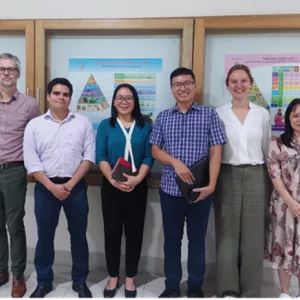Discussing trade-offs in the Vietnamese food system with key stakeholders
Two years ago, researchers from Wageningen University and Research (WUR) began collaborating with Vietnamese colleagues to analyze future food system scenarios in Viet Nam. As part of the CGIAR Research Initiative on Sustainable Healthy Diets through Food Systems Transformation (SHiFT), this research sought to identify important trade-offs that could provide insight for transforming Viet Nam’s food systems. Using a mixed-method

Discussing trade-offs in the Vietnamese food system with key stakeholders
Two years ago, researchers from Wageningen University and Research (WUR) began collaborating with Vietnamese colleagues to analyze future food system scenarios in Viet Nam. As part of the CGIAR Research Initiative on Sustainable Healthy Diets through Food Systems Transformation (SHiFT), this research sought to identify important trade-offs that could provide insight for transforming Viet Nam’s food systems.
Using a mixed-method approach, the study combined input from workshops and stakeholder consultations with scenario modelling and trade-off analysis through simulation models (Figure 1). In October 2024, findings from the study were presented to key stakeholders during a visit to Viet Nam, prompting discussions on potential implications and applications of the results.

Discussing results and implications with Strategic Partners
During the visit to Viet Nam, SHiFT researchers from WUR facilitated meetings with SHiFT’s three Strategic Partners: the National Institute of Nutrition (NIN), the Institute of Policy and Strategy for Agriculture and Rural Development (IPSARD), and the Vietnam Academy of Agricultural Sciences (VAAS) to discuss results from the scenario modelling exercise. The modelling focused on the implementation of Viet Nam’s National Action Plan on Food Systems Transformation (NAP-FST) to transform the national food system, combining interventions targeting both consumption and production aspects of the food system.
National Institute of Nutrition (NIN)
At NIN, discussions centered on the trade-offs between achieving healthy and sustainable diets. The modelling exercise demonstrated how a holistic approach, as outlined in the NAP, could help navigate some of the trade-offs. However, certain challenges will remain, such as freshwater use and pesticide application in fruit and vegetable production.
Positive findings, based on the optimistic assumption that the entire population adopts a healthy and sustainable diet, highlighted the need for supportive interventions like nutritional labelling and the tax on sugary drinks – initiatives which are already in place or have been approved for future implementation. Dr. Truong Tuyet Mai, Vice Director of NIN, emphasized the importance of strengthening inter-ministerial collaboration, particularly with the Ministries of Environment, Trade, and Education, to address interconnected food system challenges.
Institute of Policy and Strategy for Agriculture and Rural Development (IPSARD)
At IPSARD, findings were presented to Vice Director Dr. Truong Thi Thu Trang and her team, focusing on sustainable food production policies. The discussion highlighted the One Million Hectare Program in the Mekong Delta, which supports the adoption of sustainable rice farming practices to enhance production and economic efficiency.
Discussions also addressed the implications of restricting rice land conversion. Dr. Trang stressed that rather than creating new policies, the effective implementation of existing policies should be prioritized. While coordination across ministries remains a challenge, progress has been made through partnerships and working groups tackling food system trade-offs.
Vietnam Academy of Agricultural Sciences (VAAS)
At the VAAS campus, Vice Director Dr. Dao The Anh and colleagues focused on the implications of the modelling exercise on Vietnam’s food system transformation agenda. Dr. Dao proposed conducting follow-up research with regional-level analyses. While the NAP provides a robust foundation for national transformation, translating strategies to the provincial level was identified as a significant challenge. Since land use decisions are made at the provincial level, more granular analyses would help pinpoint key factors for allocating land among agriculture, industry, and other sectors.
Across all three partnerships, the concept of a dashboard to disseminate the modelling analysis was enthusiastically received. This tool would allow users to interact with the data, focusing on specific issues such as outcome indicators or food groups. While the dashboard’s complexity could limit its direct utility for policymakers, it was agreed that its primary audience should be researchers from institutes like NIN, IPSARD, and VAAS. These researchers could use the dashboard to provide tailored advice to policymakers, bridging the gap between complex modelling outputs and actionable policy insights.

Presenting at the International Conference on Green Transformation
In addition to the meetings with Strategic Partners, results from this research were shared during the first International Conference on Green Transformation, held in Hanoi, Viet Nam, in October 2024. Organized by the School of Interdisciplinary Studies at Vietnam National University, the conference focused on promoting environmentally sustainable practices in sectors like energy transition, circular economy, and agro-ecology.
During a plenary session, WUR researcher Dr. Marcos Dominguez presented key findings from the modelling exercise, highlighting how a holistic approach combining consumer and production policies as outlined in the NAP, can help navigate trade-offs and create synergies across food system outcomes.
We would like to thank all Strategic Partners and participants of the International Conference on Green Transformation for their insights and fruitful discussions. Their contributions have been essential in refining the modelling exercise and shaping the development of the dashboard.
Written by Sophie Galema, Michiel van Dijk, Marcos Dominguez
Header image: Group photo with Dr. Mai and other colleagues from NIN.
The International Food Policy Research Institute and the Alliance of Bioversity International and CIAT lead SHiFT in close collaboration with Wageningen University and Research and with contributions from the International Potato Center. SHiFT combines high-quality nutritional and social science research capacity with development partnerships to generate innovative, robust solutions that contribute to healthier, more sustainable dietary choices and consumption of sustainable healthy diets. It builds on CGIAR’s unparalleled track record of agricultural research for development, including ten years of work on food systems and nutrition under the CGIAR Research Program on Agriculture for Nutrition and Health.

